Course overview
Foundation year Work placement
School of Arts & Creative Industries
See what it's like to study at our School of Arts & Creative Industries.
Our fine art course is student-centred and practice based. You learn by working on projects in the studio alongside your peers and staff. Our experienced team of artists and academics coach you to find and grow your creative voice, building on your distinct skills and motivations, and guiding you to experiment with new formats and media to develop your ideas.
You collaborate with your peers to gain new perspectives, developing your voice and practice. Grow your resilience by producing a creative drawing and writing journal, capturing your challenges, milestones and reflections to see patterns in your thinking and linking reoccurring ideas. Alongside this, you learn how to thrive in the creative industries, from testing ideas and creative directions to understanding pitching etiquette and developing large-scale projects.
Our course is supported by our very own international contemporary art gallery MIMA (Middlesbrough Institute of Modern Art), a Plus Tate Museum and gallery with a permanent art collection. The gallery supports the bridge between being a student and becoming a professional artist. Through experiencing the behind-the-scenes working of a museum, you can better understand the work of artists, producers, curators, museum education officers and marketing teams. These interactions help you take the next steps in your career. You have the opportunity to put these skills into action through staging exhibitions of your work with partner galleries, and events in Teesside and beyond.
Top reasons to study fine art at Teesside University:
- Nationally recognised:
- Teesside University was ranked 9th for Student Satisfaction for Art & Design in the Complete University Guide 2024. (84 institutions were ranked. tees.ac.uk/source)
- 97.6% of design studies students agreed that staff were good at explaining things. (National Student Survey 2024, tees.ac.uk/source)
- Industry-standard facilities: you have access to our wood, metal, print, photography and fabric workshops, providing space to explore techniques that may be new to you. Our technical team support you to realise concepts that might have seemed impossible to achieve.
- Personal space: you have your own studio for the duration of your studies - a personal space to make, experiment and think critically about your work in a supportive environment with your peer community.
- Expert teaching: you learn from accomplished and award-winning practising artists and curators who have presented their work nationally and internationally.
- Scholarships and opportunities: you may be eligible for one of our scholarships. You also have opportunities for fellowships and international mobility opportunities with our partners in Prague, Dubai and India.
Creative UK
 Take advantage of our Creative UK membership and help futureproof your career, with networking events, a resource hub to support professional development, and bespoke workshops in partnership with industry leaders and mentors. Sign up for free student membership to get opportunities, events and newsletters sent directly to your inbox.
Take advantage of our Creative UK membership and help futureproof your career, with networking events, a resource hub to support professional development, and bespoke workshops in partnership with industry leaders and mentors. Sign up for free student membership to get opportunities, events and newsletters sent directly to your inbox.
Course details
Course structure
Year 1 core modules
Enhance your skills in team-working, communication, project management and negotiation. You collaborate with a group of your course mates to produce a small-scale creative project in response to a subject-specific brief.
This is a 20-credit module.
Consider the key methods, tools and critical concepts of creative work, its discussion and historical and modern-day practice. You create a body of work which explores contemporary conversations on art making, following a self-negotiated studio assignment brief. You also explore different making processes and publics.
This is a 40-credit module.
Introduction to the Creative Industries
With many opportunities in the creative industries sector, learn how to start on your career path while developing vital employability skills such as networking and digital presence. Understand the structure of the sector and the interdisciplinary relationships between art, design and media. Discover how the sector operates locally, nationally and globally – debating the role of policy and the importance of sustainability.
This is a 20-credit module.
You explore techniques and strategies for art making and the development of an art practice, while developing preliminary skills in artist research and problem solving. Investigate different ideas and making perspectives, while learning the safe and appropriate use of specialist equipment.
This is a 40-credit module.
Year 2 core modules
Develop critical thinking and analysis skills, exploring contemporary issues and debates related to the creative industries. You research a specific area or development within your chosen subject – this may be technical, economic, ethical, legal, cultural, sociological, or a combination. You draw on appropriate academic and industry sources to contextualise your research. You present your topic and initial research within taught sessions, providing an opportunity for peer and tutor feedback.
This is a 20-credit module.
You build a body of experimental work that demonstrates your ability to think and create critically. Develop a self-initiated project through exploratory studio sessions and group critiques, broadening your knowledge of art-making processes. You can explore text, sound, painting, sculpture, performance, photography, digital, post-internet, video, 2D, 3D and 4D practices in your work.
This is a 40-credit module.
You develop and explore, in depth, a creative industry-based project in your specialist area of design, art, media, music, photography or illustration - relevant to your future professional practice. While forming a professional portfolio of work, you experience real-world business scenarios and challenges, industry competitions and cross and inter-disciplinary activities. You gain skills in project management, applied research methods and collaborative creative work.
This is a 40-credit module.
Working in the Creative Industries
There are many challenges facing contemporary art, design and media practices. You research the social, political or ecological challenges around us to generate a small-scale project. You develop and reflect on your understanding of enterprise in the context of the creative industries. Contextualise your own professional practice and aspirations through application of critical thinking and problem-solving skills.
This is a 20-credit module.
Optional work placement year
You have the option to spend one year in industry learning and developing your skills. We encourage and support you with applying for a placement, job hunting and networking.
You gain experience favoured by graduate recruiters and develop your technical skillset. You also obtain the transferable skills required in any professional environment, including communication, negotiation, teamwork, leadership, organisation, confidence, self-reliance, problem-solving, being able to work under pressure, and commercial awareness.
Many employers view a placement as a year-long interview, therefore placements are increasingly becoming an essential part of an organisation's pre-selection strategy in their graduate recruitment process. Benefits include:
· improved job prospects
· enhanced employment skills and improved career progression opportunities
· a higher starting salary than your full-time counterparts
· a better degree classification
· a richer CV
· a year's salary before completing your degree
· experience of workplace culture
· the opportunity to design and base your final-year project within a working environment.
If you are unable to secure a work placement with an employer, then you simply continue on a course without the work placement.
Final-year core modules
You produce a self-managed, individual extended piece of independent investigation and/or creative production or portfolio of work. Supervised by an academic member of staff, you take responsibility for the planning and execution of the work, including the consideration of associated legal, social, ethical and professional issues. You explore in depth a chosen subject area, demonstrating your ability to analyse, synthesise and creatively apply your learning, showing critical and evaluative skills and professional awareness.
This is a 60-credit module.
Plan and implement your departure from education to your first or new career, or to further study. You continue your creative practice, developing a portfolio and/or extended piece of work which reflects you as a creative. You explore discipline-specific employability strategies, and engage and network with industry to develop key connections.
This is a 60-credit module.
Modules offered may vary.
How you learn
Think, dream and make: learn through doing, with focused studio time for practice-based creative work, allowing you to develop ideas and undertake larger-scale, more ambitious projects.
Develop your creative voice: you are coached to find and grow your creative voice. Collaboration with industry professionals and your peers gives you new perspectives on developing your practice.
Grow resilience: develop a creative journal, capturing your challenges, milestones and reflections to see patterns in your thinking and linking reoccurring ideas. You learn how to test ideas, explore creative directions, understand pitching etiquette and develop large-scale projects to help you thrive in the creative industries.
Join the creative sector: our intensive, career-focused modules help you understand working in the arts and creative industries. From industry leaders’ professional wisdom and insight to accessing professional opportunities and creative coaching, you become an industry insider and leave with a working understanding of the professional community.
Become connected: access our network of alumni and practising creatives at Middlesbrough Institute of Modern Art (MIMA). Benefit from supportive voices, specialist expertise, shared wisdom and new ideas, establishing critical relationships that propel you into your creative career.
Get creative: take part in MIMA Creative Week, a festival of workshops where you experiment with new materials, go on field trips and upgrade your tech skills.
Expand your horizons: collaborate with our international partners in Prague, Dubai and India becoming international creative citizens while developing an understanding of wider global contexts, sustainability and the changing shape of equality and diversity.
How you are assessed
The continuous assessment structure allows key assessment deadlines to be located at the mid-point and endpoint of each academic year.
Our Disability Services team provide an inclusive and empowering learning environment and have specialist staff to support disabled students access any additional tailored resources needed. If you have a specific learning difficulty, mental health condition, autism, sensory impairment, chronic health condition or any other disability please contact a Disability Services as early as possible.
Find out more about our disability services
Find out more about financial support
Find out more about our course related costs
Entry requirements
Entry requirements
Year 1 entry
96-112 points, including a creative subject, from any combination of recognised Level 3 qualifications. Consideration is also given to students without formal qualifications but with evidence of practical art and design experience at an appropriate level. Applicants may be invited to share a portfolio where applicable to show creative skills in fine art.
Applicants are invited join us on campus for an applicant day, enabling you to see our fine arts facilities, get feedback on your portfolio from members of the fine art team meet staff and students and learn more about studying at Teesside University.
Non-EU international students who need a student visa to study in the UK should check our web pages on UKVI-compliant English language requirements. The University also provides pre-sessional English language courses to help you meet the English language requirements.
Helping you meet the entry requirements
We may be able to help you meet the requirements for admission by offering you the opportunity to study one or more Summer University modules, some of which can be studied by distance learning.
Alternative degree with integrated foundation year
If you are unable to achieve the minimum admission requirements for Year 1 entry you could, subject to eligibility, join one of our degree courses with an integrated foundation year.
Direct entry to later years
If you have previously studied at higher education level (for example, a foundation degree, HNC, HND or one or more years at degree level at another institution) you may request direct entry to Year 2 or year 3 of this degree.
Mature applicants
We welcome applications from mature students (aged over 21) who can demonstrate, through portfolio/written work and relevant experience, that they have developed cognitive and technical skills through their life experiences.
For general information please see our overview of entry requirements
International applicants can find out what qualifications they need by visiting Your Country
For general information please see our overview of entry requirements
International applicants can find out what qualifications they need by visiting Your Country
You can gain considerable knowledge from work, volunteering and life. Under recognition of prior learning (RPL) you may be awarded credit for this which can be credited towards the course you want to study.
Find out more about RPL
Employability
Career opportunities
Our students graduate as confident, creative practitioners. Graduates have gone on to establish successful galleries and studio spaces such as Gloam in Sheffield, undertake major national and international commissions, and work at galleries such as the Baltic, MIMA or as art therapists in the NHS.
Information for international applicants
Qualifications
International applicants - find out what qualifications you need by selecting your country below.
Select your country:
Useful information
Visit our international pages for useful information for non-UK students and applicants.













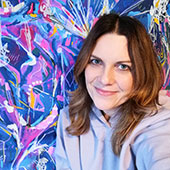 BA (Hons) Fine Art
BA (Hons) Fine Art 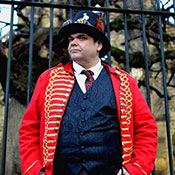 BA (Hons) Fine Art
BA (Hons) Fine Art  BA (Hons) Fine Art
BA (Hons) Fine Art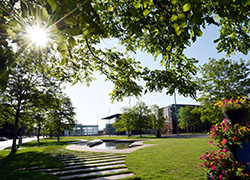 Tees Valley to gain from STEAM development project as MIMA, Teesside University and partners secure funding
Tees Valley to gain from STEAM development project as MIMA, Teesside University and partners secure funding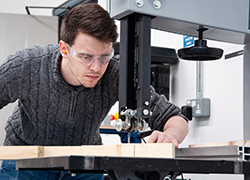 Cameron moulding a successful arts career
Cameron moulding a successful arts career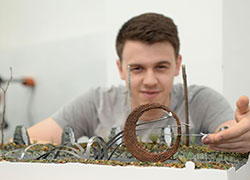 Fine art student’s sculpture design shortlisted for prestigious award
Fine art student’s sculpture design shortlisted for prestigious award